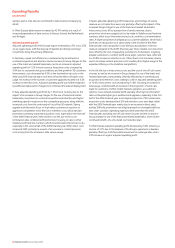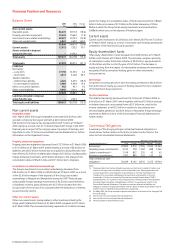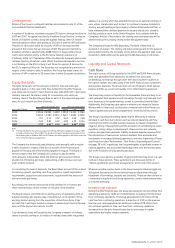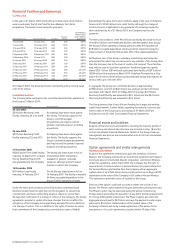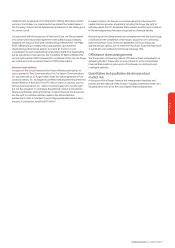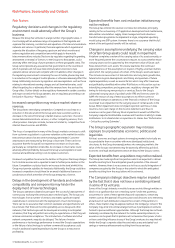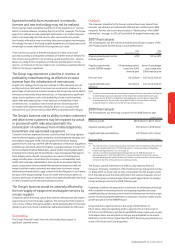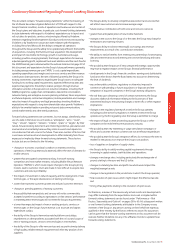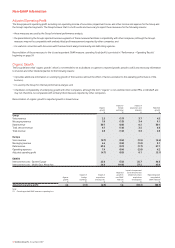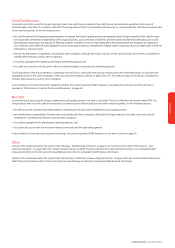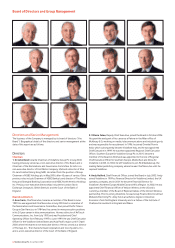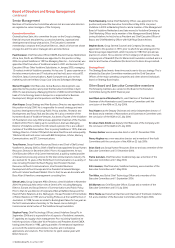Vodafone 2007 Annual Report Download - page 60
Download and view the complete annual report
Please find page 60 of the 2007 Vodafone annual report below. You can navigate through the pages in the report by either clicking on the pages listed below, or by using the keyword search tool below to find specific information within the annual report.58 Vodafone Group Plc Annual Report 2007
Risk Factors
Regulatory decisions and changes in the regulatory
environment could adversely affect the Group’s
business.
Because the Group has ventures in a large number of geographic areas, it
must comply with an extensive range of requirements that regulate and
supervise the licensing, construction and operation of its telecommunications
networks and services. In particular, there are agencies which regulate and
supervise the allocation of frequency spectrum and which monitor and
enforce regulation and competition laws which apply to the mobile
telecommunications industry. Decisions by regulators regarding the granting,
amendment or renewal of licences, to the Group or to third parties, could
adversely affect the Group’s future operations in these geographic areas. The
Group cannot provide any assurances that governments in the countries in
which it operates will not issue telecommunications licences to new
operators whose services will compete with it. In addition, other changes in
the regulatory environment concerning the use of mobile phones may lead
to a reduction in the usage of mobile phones or otherwise adversely affect the
Group. Additionally, decisions by regulators and new legislation, such as those
relating to international roaming charges and call termination rates, could
affect the pricing for, or adversely affect the revenue from, the services the
Group offers. Further details on the regulatory framework in certain countries
and regions in which the Group operates, and on regulatory proceedings can
be found in “Business – Regulation”.
Increased competition may reduce market share or
revenue.
The Group faces intensifying competition. Competition could lead to a
reduction in the rate at which the Group adds new customers and to a
decrease in the size of the Group’s market share as customers choose to
receive telecommunications services, or other competing services, from
other providers. Examples include, but are not limited to, competition from
internet-based services and MVNOs.
The focus of competition in many of the Group’s markets continues to shift
from customer acquisition to customer retention as the market for mobile
telecommunications has become increasingly penetrated. Customer
deactivations are measured by the Group’s churn rate. There can be no
assurance that the Group will not experience increases in churn rates,
particularly as competition intensifies. An increase in churn rates could
adversely affect profitability because the Group would experience lower
revenue and additional selling costs to replace customers.
Increased competition has also led to declines in the prices the Group charges
for its mobile services and is expected to lead to further price declines in the
future. Competition could also lead to an increase in the level at which the
Group must provide subsidies for handsets. Additionally, the Group could face
increased competition should there be an award of additional licences in
jurisdictions in which a member of the Group already has a licence.
Delays in the development of handsets and network
compatibility and components may hinder the
deployment of new technologies.
The Group’s operations depend in part upon the successful deployment of
continuously evolving telecommunications technologies. The Group uses
technologies from a number of vendors and makes significant capital
expenditures in connection with the deployment of such technologies.
There can be no assurance that common standards and specifications will
be achieved, that there will be inter-operability across Group and other
networks, that technologies will be developed according to anticipated
schedules, that they will perform according to expectations or that they will
achieve commercial acceptance. The introduction of software and other
network components may also be delayed. The failure of vendor
performance or technology performance to meet the Group’s expectations
or the failure of a technology to achieve commercial acceptance could
result in additional capital expenditures by the Group or a reduction in
profitability.
Expected benefits from cost reduction initiatives may
not be realised.
The Group has entered into several cost reduction initiatives principally
relating to the outsourcing of IT application development and maintenance,
data centre consolidation, supply chain management and a business
transformation programme to implement a single, integrated operating
model using one ERP system. However, there is no assurance that the full
extent of the anticipated benefits will be realised.
Changes in assumptions underlying the carrying value
of certain Group assets could result in impairment.
Vodafone completes a review of the carrying value of its assets annually, or
more frequently where the circumstances require, to assess whether those
carrying values can be supported by the net present value of future cash
flows derived from such assets. This review examines the continued
appropriateness of the assumptions in respect of highly uncertain matters
upon which the carrying values of certain of the Group’s assets are based.
This includes an assessment of discount rates and long term growth rates,
future technological developments and timing and quantum of future
capital expenditure, as well as several factors which may affect revenues
and profitability identified within other Risk Factors in this section such as
intensifying competition, pricing pressures, regulatory changes and the
timing for introducing new products or services. Due to the Group’s
substantial carrying value of goodwill under IFRS and licences under US
GAAP, the revision of any of these assumptions to reflect current or
anticipated changes in operations or the financial condition of the Group
could lead to an impairment in the carrying value of certain assets in the
Group. Whilst impairment does not impact reported cash flows, it does
result in a non-cash charge on the income statement, and thus no
assurance can be given that any future impairments would not affect the
Company’s reported distributable reserves and therefore its ability to make
distributions to its shareholders or repurchase its shares. See “Performance
– Critical Accounting Estimates”.
The Group’s geographic expansion may increase
exposure to unpredictable economic, political and
legal risks.
Political, economic and legal systems in emerging markets historically are
less predictable than in countries with more developed institutional
structures. As the Group increasingly enters into emerging markets, the
value of the Group’s investments may be adversely affected by political,
economic and legal developments which are beyond the Group’s control.
Expected benefits from acquisitions may not be realised.
The Group has made significant acquisitions which are expected to deliver
benefits resulting from the anticipated growth potential of the relevant
markets. However, there is no assurance as to the successful integration of
companies acquired by the Group or the extent to which the anticipated
benefits resulting from the acquisitions will be achieved.
The Company’s strategic objectives may be impeded
by the fact that it does not have a controlling interest
in some of its ventures.
Some of the Group’s interests in mobile licences are held through entities in
which it is a significant but not controlling owner. Under the governing
documents for some of these partnerships and corporations, certain key
matters such as the approval of business plans and decisions as to the timing
and amount of cash distributions require the consent of the partners. In
others, these matters may be approved without the Company’s consent. The
Company may enter into similar arrangements as it participates in ventures
formed to pursue additional opportunities. Although the Group has not been
materially constrained by the nature of its mobile ownership interests, no
assurance can be given that its partners will not exercise their power of veto
or their controlling influence in any of the Group’s ventures in a way that will
hinder the Group’s corporate objectives and reduce any anticipated cost
savings or revenue enhancement resulting from these ventures.
Risk Factors, Seasonality and Outlook


